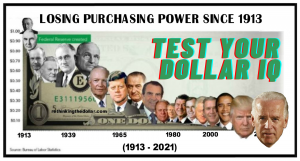Monetary affairs have always been subject to government intervention of one kind or another. In ancient times, these interventions were made to raise funds for public spending; by debasing the coinage, kings and other rulers could raise taxes without having to abide by constitutional rules and without raising popular anger at their spending.
Increasingly, through legal tender laws and the creation of central banks, government took more and more control over monetary affairs in order to shape the economy, to the point that monetary mandarins can nowadays seriously discuss regulating how much money each individual person should have in his bank account by imposing negative interest rates. In this environment, the idea that money might be free from all government intervention is almost inconceivable to most people.
Yet there is no reason, as we shall attempt to show in the following, that money could not be produced and regulated on the free market — in fact, free market monetary institutions would be infinitely better than the current regime of fiat money produced and distributed by central banks. Both the production of money in the narrower sense and of money substitutes in the broader sense can easily be handled by market actors.
The Production of Base Money
Over the course of historical evolution, the precious metals gold and silver were selected as the most commonly used media of exchange — money. Carl Menger has shown how this selection was not consciously imposed on society by a wise ruler or by a social compact but gradually evolved as a result of individuals pursuing their own ends. The physical characteristics of precious metals made them eminently suitable as money: high value per unit weight, high malleability and divisibility to facilitate exchange, high durability, and transportability make them easy to use across time and space.
Had it not been for government intervention, gold and silver would still be in widespread use as money, and were all government intervention to end, there is no doubt that they would again be so used, perhaps supplemented with bitcoin or similar digital assets. Yet how would they be supplied and distributed on the market?
The two important concepts to keep in mind here are market demand and the law of costs. As with all other goods, gold and silver for monetary use will only be produced in response to market demand. Factors of production will only be allocated to such production if it is their most profitable use, that is, if the expected profit in money production is higher than the opportunity cost of the factors. In the long run, as entrepreneurs bid for factors and allocate them to their most profitable uses, opportunity costs will tend to equalize selling prices. In the case of the monetary metals, there will be little extra addition to the stock of money in the long run, as the profitability of nonmonetary uses will be greater than or equal to the monetary uses of the precious metals. Since gold and silver are both extremely durable, virtually the entire stock of both metals ever mined is still in existence. The current production in any year is negligible next to the existing stock, rising to at most 1 or 2 percent. We can imagine that gold, being more valuable, would be used for larger transactions and that silver would be used for smaller ones, but this need not be the case. There might develop a cultural preference for one metal over the other, or it might be, as Saifedean Ammous argues, that the nonmonetary use of silver is so important today that fluctuations in its price from the industrial side would make it unsuitable as a medium of exchange. These are all questions that cannot be settled theoretically.
We should not expect money production to dwindle to zero. There will be continuous change in market conditions, both on the side of supply and of demand. What will happen if demand for money increases? The first effect will be that the purchasing power of money increases. This in turn will stimulate mining and the flow of monetary commodities from their nonmonetary uses into cash balances, and this will continue until the purchasing power of money again falls to a level corresponding to the opportunity cost of money in its nonmonetary uses. A fall in the demand for money will have precisely the reverse effects, as the stock of money falls until the opportunity cost and the purchasing power of money are again roughly equal.
Changes in the supply of monetary commodities will also affect the value of money: e.g., a cost-saving invention may reduce the cost of gold mining, which will stimulate the flow of gold into monetary uses until the purchasing power of gold has fallen to a level corresponding to the opportunity cost of using it for monetary purposes.
Unlike with the current system, there will be no dislocations or redistribution due to money production in a free market monetary system. It is true that some entrepreneurs, capitalists, and workers will produce money and profit from this production — but they will only be able to produce money so long as this is demanded by the consumers, and unlike under the current system, the producers of money will not earn a significant benefit from being the first receivers of new money. Their incomes are precisely analogous to everybody else’s: determined by the demand of the consumers for the services and goods supplied.
The Production of Money Substitutes
Ludwig von Mises explained how a claim to money might do exactly the same “work” as money itself. This fact explains the great importance of banking in monetary affairs. Banks are the producers par excellence of money substitutes, as bank notes and checking accounts with banks are seen as perfectly secure claims to money. If they issue more such claims than they have money in the vault to back, they expand the money supply. Would this be possible on the free market, or is it a result of government privilege?
The absence of government intervention when it comes to banking must mean complete laissez-faire in banking. But this not only means no special privileges, no federal deposit insurance, and no regulations imposed on banks, it also means, in the words of Mises,
to subject all banks to the rule of common law and the commercial codes that oblige everybody to perform contracts in full faithfulness to the pledged word.
Insofar as checking accounts constitute warehouse receipts to money, as Rothbard claimed, clearly any uncovered issue of money substitutes would be fraudulent.
Some may claim that not all money substitutes legally are warehouse receipts; rather, they are callable loans, in which the bank only promises to repay the loan on demand. This is, for instance, the case with savings accounts subject to check. While this is not fraudulent, it is probable that such loans have benefited from the existence of central banking and all the explicit and implicit guarantees of the fiat money system. In order for a claim to money to function as a money substitute, it must not only be instantly redeemable; it must also be (considered as) perfectly secure. Callable loans fall short of the second requirement, as they are not really as secure as money or warehouse receipts. Therefore, it would be natural that they would trade at a discount to money and not really form part of the money supply.
On the free market, we should therefore expect a banking sector devoted to the task of warehousing money and facilitating exchange, but we should also expect a lively financial sector issuing various products that will have the legal character of callable loans. In the long run, these cannot be part of the money supply, because they will always trade at a discount to money due to the uncertainty inherent in their character, but they will nevertheless be important for savers seeking short-term investments.
We have here shown how money could be handled on a market completely free from government intervention. It should be clear that such intervention is not necessary for the functioning of the monetary system: both the production of money in the narrow sense and of money substitutes is eminently possible on the free market. The only stipulation necessary is respect for property rights and the performance of contracts — but these are simply the general conditions for any civilized society anywhere.
by Kristoffer Mousten Hansen via Mises Wire

RTD 1oz. Round
RTD 5oz. Round












0 Comments